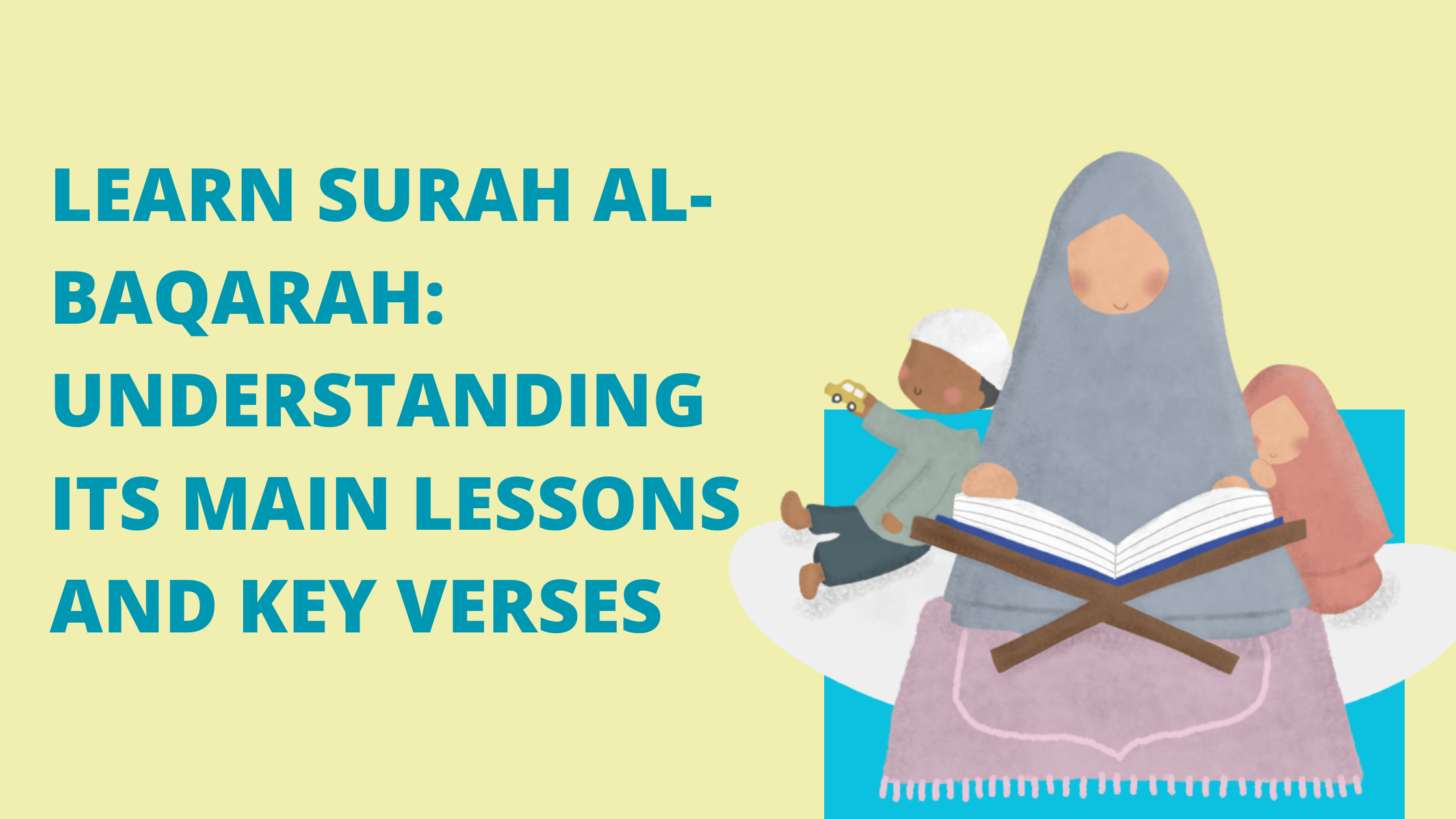vvDelving into the intricate depths of Surah Al-Baqarah, the longest chapter of the Quran, is akin to embarking on a profound journey of faith and understanding.
This comprehensive Surah revealed in Medina, encapsulates many teachings essential to Islamic belief and practice. Its profound verses address a myriad of topics ranging from legal rulings to spiritual admonitions, from historical narratives to ethical injunctions.
Among its myriad lessons, Surah Al-Baqarah emphasizes the importance of faith in the unseen, the significance of patience and perseverance in times of trial, and the virtues of charity and compassion towards others.
It elucidates the principles of justice, integrity, and accountability, urging believers to uphold these values in their conduct and social interactions. Additionally, the Surah underscores the necessity of obedience to divine commandments and the consequences of straying from the path of righteousness.
In this article, we delve into the significance of Surah Al-Baqarah, unravel the main lessons embedded within its sacred verses, explore its thematic richness, and outline a structured methodology for learning and memorizing this illustrious chapter of the Quran.
Table of Contents
What is Surah Al-Baqarah?
Surah Al-Baqarah, the second chapter of the Quran, is the longest surah, comprising 286 verses. It was revealed in Medina and covers a broad range of topics essential to the Islamic faith and practice. The surah addresses legal matters, social justice, morality, guidance for personal conduct, and the stories of past prophets to draw lessons for the Muslim community. It includes the famous Ayat al-Kursi (Verse of the Throne), which emphasizes the greatness and sovereignty of Allah. The surah also details rules on prayer, fasting, charity, pilgrimage, marriage, and financial transactions, making it a comprehensive guide for Muslims.
One of the significant themes of Surah Al-Baqarah is the covenant between Allah and the believers. It reminds Muslims of their responsibilities to uphold justice, follow divine guidance, and maintain faith in Allah amidst challenges. The surah also emphasizes the importance of patience, perseverance, and gratitude. By recounting the experiences of previous communities, such as the Children of Israel, it warns against disobedience and ingratitude while encouraging steadfastness and righteousness. Overall, Surah Al-Baqarah is a foundational text for understanding Islamic law, ethics, and spirituality.
What are the Lessons in Surah Al-Baqarah?
Surah Al-Baqarah contains numerous educational lessons such as the significance of the Quran as a source of guidance, the importance of faith, obedience, patience, gratitude, respect for sacred traditions, sincerity in worship, and the consequences of rebellion.
It emphasizes the need for a balanced life, critical thinking, adherence to divine covenants, and the significance of miracles and divine signs.
Additionally, it highlights the virtues of charity, the prohibition of interest, the necessity of written contracts and witnesses in transactions, and the power of trust and supplication to Allah. These teachings provide comprehensive guidance for moral and spiritual development.
Here is a breakdown of some key lessons from Surah Al-Baqarah:
1. The Quran as a Guidance
The Quran is a book of guidance, indispensable for both the educator and the learner. Allah says, “This is the Book about which there is no doubt, a guidance for those conscious of Allah” (Al-Baqarah: 2). It emphasizes the importance of the Quran as a source of direction and moral compass.
2. Belief in the Unseen
Faith in the unseen acts as a motivator for actions, aiding in achievement and serving as an effective means for self-monitoring. Allah says, “Who believe in the unseen” (Al-Baqarah: 3). This highlights the role of unseen beliefs in fostering trust and integrity.
3. Certainty in the Hereafter
Having unwavering faith in the afterlife should be ingrained in the believer’s consciousness as if they can see it before their eyes. Allah says, “And they are certain of the Hereafter” (Al-Baqarah: 4). This underlines the importance of a clear vision of the afterlife in guiding one’s actions.
4. Teaching About Allah’s Bounties
One of the primary purposes of the Quran is to introduce Allah, including His blessings and provisions for His creation. Allah says, “Who made for you from the earth a bed and the sky a canopy and sent down from the sky rain and brought forth thereby fruits as provision for you” (Al-Baqarah: 22). This encourages educators to remind learners of Allah’s blessings.
5. Warning of Hellfire
Hellfire is the awaited punishment for those deserving, and warning about it serves as a deterrent from sins. Allah says, “But if you do not – and you will never be able to – then fear the Fire whose fuel is men and stones” (Al-Baqarah: 24). It acts as a strong deterrent against wrongdoing.
6. Promise of Paradise
Paradise is the reward prepared by Allah for His chosen ones, and linking the learners to Paradise motivates achievement and piety. Allah says, “And give good tidings to those who believe and do righteous deeds that they will have gardens [in Paradise] beneath which rivers flow” (Al-Baqarah: 25). This serves as an encouragement to strive for righteous deeds.
7. Humility Before God
To avoid arrogance and self-admiration, one should attribute all knowledge and achievements to Allah. Allah says, “They said, ‘Exalted are You; we do not know what You have taught us'” (Al-Baqarah: 32). This teaches humility and acknowledgment of Allah’s role in bestowing knowledge.
8. Arrogance as the Root of All Evil
Arrogance is the greatest of sins and the door to all calamities. Allah says, “Except for Iblees. He refused and was arrogant” (Al-Baqarah: 34). It warns against the dangers of pride and arrogance.
9. Satan’s Role in Sin
Satan is one of the main causes of falling into sin. Allah says, “But Satan caused them to slip out of it and removed them from that [condition] in which they had been” (Al-Baqarah: 36). It highlights the need to be vigilant against Satan’s temptations.
10. Value of Repentance
Repentance is a gift and a blessing that deserves gratitude. Allah says, “Then Adam received from his Lord words, and He accepted his repentance” (Al-Baqarah: 37). This encourages seeking forgiveness and valuing the opportunity to repent.
11. Following Divine Guidance for Happiness
True happiness is achieved by following Allah’s guidance, leading to the absence of fear and sorrow. Allah says, “So there will be no fear concerning them, nor will they grieve” (Al-Baqarah: 38). This lesson emphasizes the peace that comes with adherence to divine guidance.
12. Consequences of Rebellion
Persistent rebellion and disobedience to Allah lead to humiliation and wretchedness. Allah says, “And humiliation and wretchedness were stamped upon them and they were covered with the wrath of Allah” (Al-Baqarah: 61). It warns of the consequences of continuous defiance against divine commands.
13. Miracles as Signs of Allah’s Power
Miracles serve as signs of Allah’s power and mercy. Allah recounts the story of the Israelites and the cow, illustrating His ability to bring the dead to life. Allah says, “And [recall] when you killed a man and disputed over it, but Allah was to bring out that which you were concealing. So, We said, ‘Strike the slain man with part of it.’ Thus does Allah bring the dead to life, and He shows you His signs that you might reason” (Al-Baqarah: 72-73). This underscores the significance of miracles in strengthening faith.
14. Balanced Life
Leading a balanced life, addressing both spiritual and material needs, is essential. Allah describes the hypocrites who say, “Our Lord, give us in this world,” but have no share in the Hereafter (Al-Baqarah: 200). This highlights the need for balance between worldly and spiritual pursuits.
15. Acknowledging Prophets and Their Teachings
Acknowledging and respecting all prophets and their teachings is vital for a Muslim’s faith. Allah says, “The Messenger has believed in what was revealed to him from his Lord, and [so have] the believers. All of them have believed in Allah and His angels and His books and His messengers” (Al-Baqarah: 285). This encourages respect for all prophets and their messages.
16. Purpose of Life Tests
Life tests are designed to distinguish between the righteous and the wicked. Allah says, “And We will surely test you with something of fear and hunger and a loss of wealth and lives and fruits, but give good tidings to the patient” (Al-Baqarah: 155). This emphasizes the purpose of trials in life.
17. Prohibition of Interest
Engaging in interest (riba) is strictly prohibited due to its exploitative nature. Allah says, “Allah has permitted trade and has forbidden interest” (Al-Baqarah: 275). This teaches economic justice and fairness.
18. Dua (Supplication)
Making dua is a powerful means of seeking help and blessings from Allah. Allah says, “And when My servants ask you concerning Me, indeed I am near. I respond to the invocation of the supplicant when he calls upon Me” (Al-Baqarah: 186). This encourages believers to regularly make dua.
What is the Main Message of Surah Al-Baqarah?
Surah Al-Baqarah, the longest chapter of the Qur’an, encompasses a wide array of themes and messages. Its primary focus is on the guidance provided to believers for living a righteous life in accordance with God’s will.
It addresses the importance of faith, obedience to Allah, and adherence to His commandments. The Surah begins by emphasizing the distinction between believers, disbelievers, and hypocrites, providing a comprehensive guide for the moral, spiritual, and social conduct of Muslims.
It includes directives on worship, charity, fasting, pilgrimage, and justice, and reinforces the significance of the Qur’an as a source of divine guidance. Additionally, Surah Al-Baqarah highlights the importance of historical context and lessons from previous prophets and communities.
The Surah recounts stories of Adam, Abraham, Moses, and other prophets to illustrate the consequences of faithfulness and rebellion against God’s commands. It emphasizes the necessity of patience, perseverance, and trust in Allah, particularly in times of trial.
It also contains laws and principles regarding family life, financial dealings, and community relations, establishing a comprehensive framework for individual and societal well-being.
Through its extensive coverage of various aspects of life, Surah Al-Baqarah aims to guide Muslims towards a balanced, just, and devout existence.
How to Learn to Read Surah Al-Baqarah?
Learning to read Surah Al-Baqarah demands dedication, patience, and a tailored approach due to its length and complexity. Navigating its Arabic script and pronunciation complexities and grasping deeper meanings can be challenging for beginners.
However, with proper guidance and consistent effort, mastery is achievable. Steps include mastering the Arabic alphabet and Tajweed rules, memorizing manageable portions, and studying meaning and context through Tafsir.
Seeking guidance from qualified teachers, regular practice with Tajweed, and maintaining patience are essential elements for success.
Here is a structured approach by which believers can deepen their understanding of Surah Al-Baqarah:
1. Understand the Arabic Alphabet
Begin by familiarizing yourself with the Arabic alphabet, including the pronunciation of each letter and its written form. Focus on recognizing and articulating the letters accurately to lay a strong foundation for reading Arabic text.
2. Learn Basic Tajweed Rules
Tajweed refers to the rules of proper pronunciation and recitation of the Qur’an. Study the basic Tajweed rules relevant to Surah Al-Baqarah, such as proper elongation (madd), stopping (waqf), and pronunciation of letters with emphasis (tajweed).
Understanding Tajweed ensures that you recite the Surah correctly and with proper reverence.
3. Memorize Surah Al-Baqarah in Portions
Due to its length, memorizing Surah Al-Baqarah can be daunting. Break it down into manageable portions based on verses or groups of verses. Start with the first few verses and gradually add more as you become comfortable. Consistent practice and repetition are key to memorization.
4. Study the Meaning and Tafsir
Understanding the meaning and context of Surah Al-Baqarah enhances your connection to the text and facilitates memorization. Utilize reliable translations and Tafsir (exegesis) to comprehend the verses’ deeper meanings, historical context, and practical implications.
This knowledge adds depth to your recitation and fosters a deeper spiritual connection.
5. Recite Regularly with Tajweed
Practice reciting Surah Al-Baqarah regularly, paying close attention to Tajweed rules. Listen to recitations by skilled Qur’an teachers or reciters to refine your pronunciation and rhythm. Incorporate regular review sessions to reinforce memorization and improve fluency.
6. Seek Guidance from a Qualified Teacher
Enroll in a Qur’an learning program or seek guidance from a qualified teacher who can provide personalized instruction and feedback. A knowledgeable teacher can correct your pronunciation, offer guidance on Tajweed rules, and provide motivation and encouragement throughout your learning journey.
7. Patience and Persistence
Learning to read Surah Al-Baqarah, like any significant endeavor, requires patience and persistence. Stay committed to your practice routine, and trust in the gradual progress you make over time.
Celebrate your achievements, no matter how small, and stay motivated by remembering the spiritual rewards of reciting and understanding the Qur’an.
By following this structured approach, tailored specifically to Surah Al-Baqarah, you can effectively learn to read, memorize, and understand this profound chapter of the Qur’an.
How to Memorize the Surah Al-Baqarah?
When it comes to memorizing Surah Al-Baqarah, breaking it down into manageable sections, understanding its meaning, and practicing Tajweed is essential.
Regular repetition, listening to recitations, and seeking guidance from instructors aid in steady progress. Patience and persistence are crucial virtues, as achieving proficiency requires dedication and perseverance.
Here is a step-by-step guide to help memorize Surah Al-Baqarah:
1. Break it Down
Dividing Surah Al-Baqarah into smaller sections or verses makes the memorization process more manageable. Start with short sections, perhaps even just a few verses at a time, and gradually increase the length as you become more comfortable.
Breaking it down allows you to focus on mastering one part at a time without feeling overwhelmed by the surah’s length.
2. Understand the Meaning
Before memorizing each verse, take the time to understand its meaning and context. This understanding not only enhances your connection with the scripture but also aids in memorization.
When you grasp the significance of what you’re memorizing, it becomes easier to remember the words and their sequence.
3. Repeat Regularly
Repetition is the cornerstone of memorization. Consistently reciting each section or verse multiple times helps imprint it into your memory. Incorporate daily review sessions to reinforce what you’ve memorized and prevent forgetting.
Through regular repetition, the verses of Surah Al-Baqarah gradually become ingrained in your memory.
4. Listen to Recitations
Listening to recitations of Surah Al-Baqarah by skilled reciters is beneficial for memorization. Hearing the verses being recited not only aids in retention but also improves your pronunciation and rhythm.
Choose recitations that resonate with you, and listen to them frequently to reinforce your memorization efforts.
5. Tajweed Practice
Tajweed rules govern the proper pronunciation and articulation of Arabic letters and words. Paying attention to Tajweed while memorizing Surah Al-Baqarah ensures accurate recitation.
Practice each verse with a focus on correct pronunciation, elongation, and rhythm, following Tajweed guidelines to refine your recitation skills.
6. Use Visualization Techniques
Visualizing the verses of Surah Al-Baqarah as you recite them can enhance memorization. Create mental images associated with the words and concepts in each verse, making them easier to recall.
Visualization engages your imagination and strengthens your memory retention, especially when combined with verbal repetition.
7. Seek Guidance
If possible, seek guidance from knowledgeable individuals or teachers who can offer assistance with memorization techniques. Qualified instructors can provide valuable feedback, correct pronunciation errors, and offer support and encouragement throughout your memorization journey.
Their guidance can help you stay on track and overcome any challenges you encounter.
8. Be Patient and Persistent
Memorizing Surah Al-Baqarah is a gradual process that requires patience and persistence. Understand that it may take time to commit the entire surah to memory, and be patient with yourself as you progress.
Stay consistent in your efforts, maintain a positive mindset, and trust your ability to succeed. With dedication and perseverance, you can achieve your goal of memorizing Surah Al-Baqarah.
Keep in mind that memorization is a journey, so stay committed and trust in your ability to master Surah Al-Baqarah. With dedication and persistence, memorizing Surah Al-Baqarah is an achievable goal.
How to Teach Kids to Memorize Surah Al-Baqarah?
Teaching children to memorize Surah Al-Baqarah necessitates a multifaceted approach that acknowledges their developmental stage and learning preferences.
1- Segmenting the Surah:
Begin by segmenting the surah into smaller, digestible portions, ensuring each section aligns with their attention span and cognitive abilities. This approach allows children to focus on manageable sections, making the memorization process less overwhelming and more achievable.
2- Interactive Activities and Games:
Integrate interactive activities and games that cater to their curiosity and creativity, making the learning journey enjoyable and immersive. This could include puzzles, matching games, or role-playing exercises that relate to the content of the surah.
3- Visual Aids:
Visual aids, such as colorful charts or storyboards, can help reinforce understanding and retention. These tools make abstract concepts more tangible and memorable, aiding in the overall learning process.
4- Audio Reinforcement:
Audio recordings of proficient recitations offer auditory reinforcement and aid in mastering pronunciation and cadence. Listening to skilled reciters can help children grasp the correct rhythm and intonation of the surah.
5- Supportive Learning Environment:
Fostering a supportive learning environment that encourages questions, exploration, and peer interaction cultivates a sense of community and enthusiasm for Quranic studies. Creating a positive and engaging atmosphere helps children feel comfortable and motivated to learn.
Some Verses from Surah Al-Baqarah in Arabic with transliteration:
Surah Al-Baqarah is the second and longest chapter of the Quran, rich with teachings, commandments, and stories that are foundational to the Islamic faith.
1- First 5 Verses of Surah Al-Baqarah
الٓمٓ (1) ذَٰلِكَ ٱلۡكِتَٰبُ لَا رَيۡبَۛ فِيهِۛ هُدٗى لِّلۡمُتَّقِينَ (2) ٱلَّذِينَ يُؤۡمِنُونَ بِٱلۡغَيۡبِ وَيُقِيمُونَ ٱلصَّلَوٰةَ وَمِمَّا رَزَقۡنَٰهُمۡ يُنفِقُونَ (3) وَٱلَّذِينَ يُؤۡمِنُونَ بِمَآ أُنزِلَ إِلَيۡكَ وَمَآ أُنزِلَ مِن قَبۡلِكَ وَبِٱلۡأٓخِرَةِ هُمۡ يُوقِنُونَ (4) أُوْلَٰٓئِكَ عَلَىٰ هُدٗى مِّن رَّبِّهِمۡۖ وَأُوْلَٰٓئِكَ هُمُ ٱلۡمُفۡلِحُونَ (5)
1- “Alif Lam Meem”
2- “Thaalika al-kitabu la rayba feeh hudan lilmuttaqeen”
3- “Allatheena yu’minoona bil-ghaybi wa yuqeemoonas-salata wa mimma razaqnaahum yunfiqoon”
4- “Wallatheena yu’minoona bima unzila ilayka wama unzila min qablika wa bil-akhirati hum yooqinoon”
5- “Ula’ika ‘ala hudan min rabbihim wa ula’ika humul-muflihoon”
2- Ayat Al-Kursi (Verse 255)
ٱللَّهُ لَآ إِلَٰهَ إِلَّا هُوَ ٱلۡحَيُّ ٱلۡقَيُّومُۚ لَا تَأۡخُذُهُۥ سِنَةٞ وَلَا نَوۡمٞۚ لَّهُۥ مَا فِي ٱلسَّمَٰوَٰتِ وَمَا فِي ٱلۡأَرۡضِۗ مَن ذَا ٱلَّذِي يَشۡفَعُ عِندَهُۥٓ إِلَّا بِإِذۡنِهِۦۚ يَعۡلَمُ مَا بَيۡنَ أَيۡدِيهِمۡ وَمَا خَلۡفَهُمۡۖ وَلَا يُحِيطُونَ بِشَيۡءٖ مِّنۡ عِلۡمِهِۦٓ إِلَّا بِمَا شَآءَۚ وَسِعَ كُرۡسِيُّهُ ٱلسَّمَٰوَٰتِ وَٱلۡأَرۡضَۖ وَلَا يَـُٔودُهُۥ حِفۡظُهُمَاۚ وَهُوَ ٱلۡعَلِيُّ ٱلۡعَظِيمُ (255)
“Allahu la ilaha illa huwa al-hayyul qayyum La ta’khuthuhu sinatun wala nawm Lahu ma fissamawati wama fil-ard Man tha allathee yashfa’u ‘indahu illa bi-ithnihi Ya’lamu ma bayna aydeehim wama khalfahum Wala yuheetoona bishay-in min ‘ilmihi illa bima shaa Wasi’a kursiyyuhu assamawati wal-ard Wala yaooduhu hifdhuhuma wahuwa al-aliyyul ‘atheem”
The Most Powerful Verses in Surah Al-Baqarah
Surah Al-Baqarah addresses various aspects of life, law, morality, and faith, providing comprehensive guidance to believers. Within this chapter, certain verses stand out for their depth, significance, and profound impact on the spiritual lives of Muslims.
These verses are often recited, memorized, and reflected upon for their power and wisdom. Here are some of the most notable Verses in Surah Al-Baqarah:
1- First 5 Verses of Surah Al-Baqarah
The first five verses of Surah Al-Baqarah emphasize that the Quran is a doubt-free divine guide for the pious, detailing the qualities of true believers: faith in the unseen, regular prayer, and charity.
Believers accept all divine revelations, firmly believe in the afterlife, and are assured of Allah’s guidance and ultimate success.
These verses set the tone for the rest of the Surah and emphasize the importance of piety and consciousness of Allah.
الٓمٓ (1) ذَٰلِكَ ٱلۡكِتَٰبُ لَا رَيۡبَۛ فِيهِۛ هُدٗى لِّلۡمُتَّقِينَ (2) ٱلَّذِينَ يُؤۡمِنُونَ بِٱلۡغَيۡبِ وَيُقِيمُونَ ٱلصَّلَوٰةَ وَمِمَّا رَزَقۡنَٰهُمۡ يُنفِقُونَ (3) وَٱلَّذِينَ يُؤۡمِنُونَ بِمَآ أُنزِلَ إِلَيۡكَ وَمَآ أُنزِلَ مِن قَبۡلِكَ وَبِٱلۡأٓخِرَةِ هُمۡ يُوقِنُونَ (4) أُوْلَٰٓئِكَ عَلَىٰ هُدٗى مِّن رَّبِّهِمۡۖ وَأُوْلَٰٓئِكَ هُمُ ٱلۡمُفۡلِحُونَ (5)
Alif, Lam, Meem.
This is the Book about which there is no doubt, a guide for those conscious of Allah –
Who believe in the unseen, establish prayer, and spend out of what We have provided for them,
And who believe in what has been revealed to you, [O Muhammad], and what was revealed before you, and of the Hereafter they are certain [in faith].”
Those are upon [right] guidance from their Lord, and it is those who are successful.
2- Ayat Al-Kursi (Verse 255)
This verse, known as Ayat Al-Kursi, is often considered the most powerful verse in the Quran. It highlights the absolute sovereignty, omnipotence, and omniscience of Allah. Reciting it is believed to offer protection from harm and evil.
ٱللَّهُ لَآ إِلَٰهَ إِلَّا هُوَ ٱلۡحَيُّ ٱلۡقَيُّومُۚ لَا تَأۡخُذُهُۥ سِنَةٞ وَلَا نَوۡمٞۚ لَّهُۥ مَا فِي ٱلسَّمَٰوَٰتِ وَمَا فِي ٱلۡأَرۡضِۗ مَن ذَا ٱلَّذِي يَشۡفَعُ عِندَهُۥٓ إِلَّا بِإِذۡنِهِۦۚ يَعۡلَمُ مَا بَيۡنَ أَيۡدِيهِمۡ وَمَا خَلۡفَهُمۡۖ وَلَا يُحِيطُونَ بِشَيۡءٖ مِّنۡ عِلۡمِهِۦٓ إِلَّا بِمَا شَآءَۚ وَسِعَ كُرۡسِيُّهُ ٱلسَّمَٰوَٰتِ وَٱلۡأَرۡضَۖ وَلَا يَـُٔودُهُۥ حِفۡظُهُمَاۚ وَهُوَ ٱلۡعَلِيُّ ٱلۡعَظِيمُ (255)
“Allah! There is no deity except Him, the Ever-Living, the Sustainer of existence. Neither drowsiness overtakes Him nor sleep. To Him belongs whatever is in the heavens and whatever is on the earth. Who is it that can intercede with Him except by His permission? He knows what is before them and what will be after them, and they encompass not a thing of His knowledge except for what He wills. His Kursi extends over the heavens and the earth, and their preservation tires Him not. And He is the Most High, the Most Great.”
3- Verses 153-157
These verses emphasize the virtues of patience and prayer, especially in the face of trials and tribulations. They provide comfort and encouragement to those who endure hardships for the sake of Allah.
يَٰٓأَيُّهَا ٱلَّذِينَ ءَامَنُواْ ٱسۡتَعِينُواْ بِٱلصَّبۡرِ وَٱلصَّلَوٰةِۚ إِنَّ ٱللَّهَ مَعَ ٱلصَّٰبِرِينَ (153) وَلَا تَقُولُواْ لِمَن يُقۡتَلُ فِي سَبِيلِ ٱللَّهِ أَمۡوَٰتُۢۚ بَلۡ أَحۡيَآءٞ وَلَٰكِن لَّا تَشۡعُرُونَ (154) وَلَنَبۡلُوَنَّكُم بِشَيۡءٖ مِّنَ ٱلۡخَوۡفِ وَٱلۡجُوعِ وَنَقۡصٖ مِّنَ ٱلۡأَمۡوَٰلِ وَٱلۡأَنفُسِ وَٱلثَّمَرَٰتِۗ وَبَشِّرِ ٱلصَّٰبِرِينَ (155) ٱلَّذِينَ إِذَآ أَصَٰبَتۡهُم مُّصِيبَةٞ قَالُوٓاْ إِنَّا لِلَّهِ وَإِنَّآ إِلَيۡهِ رَٰجِعُونَ (156) أُوْلَٰٓئِكَ عَلَيۡهِمۡ صَلَوَٰتٞ مِّن رَّبِّهِمۡ وَرَحۡمَةٞۖ وَأُوْلَٰٓئِكَ هُمُ ٱلۡمُهۡتَدُونَ (157)
“O you who have believed, seek help through patience and prayer. Indeed, Allah is with the patient. And do not say about those who are killed in the way of Allah, ‘They are dead.’ Rather, they are alive, but you perceive [it] not. And We will surely test you with something of fear and hunger and a loss of wealth and lives and fruits, but give good tidings to the patient, who, when disaster strikes them, say, ‘Indeed we belong to Allah, and indeed to Him we will return.’ Those are the ones upon whom are blessings from their Lord and mercy. And it is those who are [rightly] guided.”
4- Verse 183
This verse introduces the obligation of fasting in Ramadan, highlighting its purpose in fostering righteousness and self-discipline.
يَٰٓأَيُّهَا ٱلَّذِينَ ءَامَنُواْ كُتِبَ عَلَيۡكُمُ ٱلصِّيَامُ كَمَا كُتِبَ عَلَى ٱلَّذِينَ مِن قَبۡلِكُمۡ لَعَلَّكُمۡ تَتَّقُونَ (183)
“O you who have believed, decreed upon you is fasting as it was decreed upon those before you that you may become righteous.”
5- Verse 186
This verse reassures believers of Allah’s closeness and His responsiveness to their prayers, emphasizing the importance of supplication and obedience.
وَإِذَا سَأَلَكَ عِبَادِي عَنِّي فَإِنِّي قَرِيبٌۖ أُجِيبُ دَعۡوَةَ ٱلدَّاعِ إِذَا دَعَانِۖ فَلۡيَسۡتَجِيبُواْ لِي وَلۡيُؤۡمِنُواْ بِي لَعَلَّهُمۡ يَرۡشُدُونَ (186)
“And when My servants ask you concerning Me, indeed I am near. I respond to the invocation of the supplicant when he calls upon Me. So let them respond to Me [by obedience] and believe in Me that they may be [rightly] guided.”
6– Last 2 Verses of Surah Al-Baqarah (Verses 285-286)
The last two verses of Surah Al-Baqarah (verses 285 and 286) emphasize core Islamic beliefs, unity among prophets, and obedience to Allah while assuring believers that they will not be burdened beyond their capacity.
These verses highlight individual accountability and include a supplication for forgiveness, mercy, and protection. They are highly revered for their spiritual strength and are often recited for divine protection and blessings.
Many Muslims include these verses in their daily prayers and personal supplications due to their profound significance and the comprehensive nature of their message.
ءَامَنَ ٱلرَّسُولُ بِمَآ أُنزِلَ إِلَيۡهِ مِن رَّبِّهِۦ وَٱلۡمُؤۡمِنُونَۚ كُلٌّ ءَامَنَ بِٱللَّهِ وَمَلَٰٓئِكَتِهِۦ وَكُتُبِهِۦ وَرُسُلِهِۦ لَا نُفَرِّقُ بَيۡنَ أَحَدٖ مِّن رُّسُلِهِۦۚ وَقَالُواْ سَمِعۡنَا وَأَطَعۡنَاۖ غُفۡرَانَكَ رَبَّنَا وَإِلَيۡكَ ٱلۡمَصِيرُ (285) لَا يُكَلِّفُ ٱللَّهُ نَفۡسًا إِلَّا وُسۡعَهَاۚ لَهَا مَا كَسَبَتۡ وَعَلَيۡهَا مَا ٱكۡتَسَبَتۡۗ رَبَّنَا لَا تُؤَاخِذۡنَآ إِن نَّسِينَآ أَوۡ أَخۡطَأۡنَاۚ رَبَّنَا وَلَا تَحۡمِلۡ عَلَيۡنَآ إِصۡرٗا كَمَا حَمَلۡتَهُۥ عَلَى ٱلَّذِينَ مِن قَبۡلِنَاۚ رَبَّنَا وَلَا تُحَمِّلۡنَا مَا لَا طَاقَةَ لَنَا بِهِۦۖ وَٱعۡفُ عَنَّا وَٱغۡفِرۡ لَنَا وَٱرۡحَمۡنَآۚ أَنتَ مَوۡلَىٰنَا فَٱنصُرۡنَا عَلَى ٱلۡقَوۡمِ ٱلۡكَٰفِرِينَ (286)
“The Messenger believes in what has been revealed to him from his Lord, and [so do] the believers. All of them have believed in Allah and His angels and His books and His messengers, [saying], ‘We make no distinction between any of His messengers.’ And they say, ‘We hear and we obey. [We seek] Your forgiveness, our Lord, and to You is the [final] destination.”
Learn the Quran Online With Bayan al-Quran Native Arab Tutors:
Embark on a transformative journey of Quranic learning with Bayan Al-Quran’s comprehensive online courses. Our platform offers an authentic and immersive experience tailored to learners worldwide. Whether you’re a beginner or seeking to enhance your skills, our Tajweed courses provide expert guidance and structured learning to master the art of Quranic recitation.
🎓 Expert Guidance:
Benefit from experienced instructors who specialize in Tajweed, breaking down complex rules into manageable segments for learners of all levels.
✨ Key Features:
- Structured, step-by-step learning approach.
- Access to high-quality instructional materials.
- Real-time feedback from qualified tutors to enhance your practice.
- Flexible learning schedules to accommodate your pace and convenience.
- Immerse yourself in the melodious tones of Quranic recitation, enriching your spiritual experience.
🌟 Why Choose Bayan Al-Quran?
Join our vibrant community dedicated to perfecting Quranic recitation. Build a profound connection with the divine words of the Quran and enrich your spiritual journey. Choose Bayan Al-Quran for a transformative learning experience and embark on a path to mastering Tajweed with confidence.
You can also attend online Quran Classes with Bayan al-Quran with Native Arab tutors. There are also several courses that can help you in this regard.
Conclusion
In conclusion, Surah Al-Baqarah stands as a beacon of divine guidance, offering profound insights and timeless wisdom to those who seek it. Its lessons resonate across time and space, providing a blueprint for leading a life of piety, righteousness, and moral excellence.
As believers reflect on its verses and imbibe its teachings, they are reminded of their responsibilities towards Allah, their fellow human beings, and the world at large.
As we navigate the complexities of our modern world, the lessons of Surah Al-Baqarah serve as a compass, guiding us through the storms of uncertainty and adversity. By internalizing its principles of faith, humility, and compassion, we can strive to create a world characterized by justice, peace, and harmony.

















